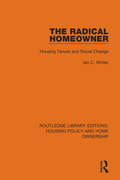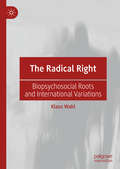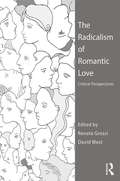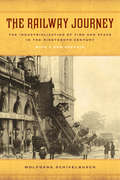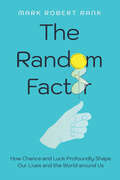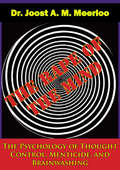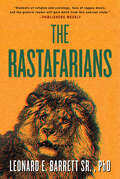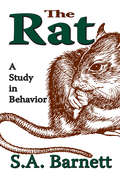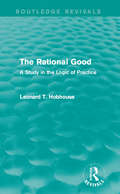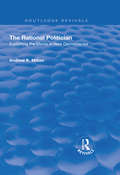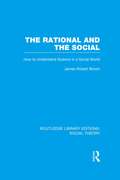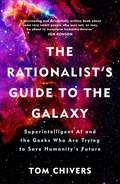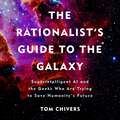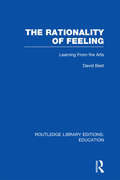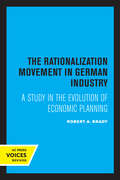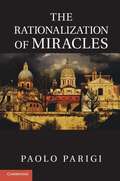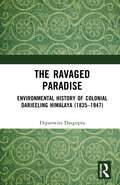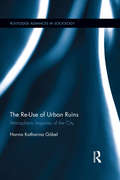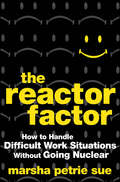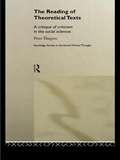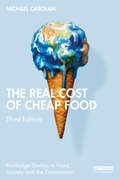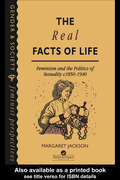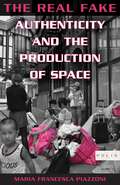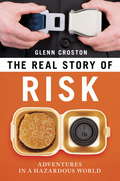- Table View
- List View
The Radical Homeowner: Housing Tenure and Social Change
by Ian C. WinterOriginally published in 1994, this book provides an important contribution to contemporary housing debates as well as clear examples of the use of qualitative data in causal analysis. Based on 3 original Australian case studies and a range of international data, this book demonstrates that the interests and meanings of home ownership can lead home owners into radical courses of social action that oppose the status quo, despite national governments having sponsored a remarkable growth in home ownership to promote a loyal citizenship and political stability.
The Radical Right: Biopsychosocial Roots and International Variations
by Klaus WahlThis book analyses the rise in xenophobia, racism, and radical right political parties, movements, and violent groups over recent years. The author provides a summary of the current state of international and interdisciplinary research on the multilevel explanations of right-wing radical thought, comparing similarities and differences across Europe and the United States. By integrating findings from psychology, history, social and life sciences, he proposes a biopsychosociological model of the conditions, causes, catalysts, and triggers of phenomena of the radical right across the world. Following a ‘demand’ and ‘supply’ analysis, Wahl explores the interaction of evolutionary emotional mechanisms and socialization processes with various environmental conditions, and consequent manifestations of radical right groups, to identify strategies to slow down the rise and effects of the radical right.
The Radicalism of Romantic Love: Critical Perspectives
by David West Renata GrossiUndoubtedly Romantic love has come to saturate our culture and is often considered to be a, or even the, major existential goal of our lives, capable of providing us with both our sense of worth and way of being in the world. The Radicalism of Romantic Love interrogates the purported radicalism of Romantic love from philosophical, cultural and psychoanalytic perspectives, exploring whether it is a subversive force capable of breaking down entrenched social, political and cultural norms and structures, or whether, in spite of its role in the fight against certain barriers, it is in fact a highly conservative impulse. Exploring both the grounds for the central place of Romantic love in contemporary lives and the meaning, extent and nature of its supposed radicalism, this volume considers love from a variety of theoretical perspectives, with attention to matters of gender, sexuality, class and ethnicity. With authors examining a range of questions, including the role of love in the same-sex marriage debate, polyamory and the notion of love as a political force, The Radicalism of Romantic Love illuminates a fundamental but perplexing aspect of our contemporary lives and will appeal to scholars across the social sciences and humanities with interests in the emotions and love as a social and political phenomenon.
The Railway Journey
by Wolfgang SchivelbuschThe impact of constant technological change upon our perception of the world is so pervasive as to have become a commonplace of modern society. But this was not always the case; as Wolfgang Schivelbusch points out in this fascinating study, our adaptation to technological change--the development of our modern, industrialized consciousness--was very much a learned behavior. In The Railway Journey, Schivelbusch examines the origins of this industrialized consciousness by exploring the reaction in the nineteenth century to the first dramatic avatar of technological change, the railroad. In a highly original and engaging fashion, Schivelbusch discusses the ways in which our perceptions of distance, time, autonomy, speed, and risk were altered by railway travel. As a history of the surprising ways in which technology and culture interact, this book covers a wide range of topics, including the changing perception of landscapes, the death of conversation while traveling, the problematic nature of the railway compartment, the space of glass architecture, the pathology of the railway journey, industrial fatigue and the history of shock, and the railroad and the city. Belonging to a distinguished European tradition of critical sociology best exemplified by the work of Georg Simmel and Walter Benjamin, The Railway Journey is anchored in rich empirical data and full of striking insights about railway travel, the industrial revolution, and technological change. Now updated with a new preface, The Railway Journey is an invaluable resource for readers interested in nineteenth-century culture and technology and the prehistory of modern media and digitalization.
The Random Factor: How Chance and Luck Profoundly Shape Our Lives and the World around Us
by Prof. Mark Robert RankUpending notions of predictability and rugged individualism to reveal how truly random the world is. It’s comforting to think that we can be successful because we work hard, climb ladders, and get what we deserve, but each of us has been profoundly touched by randomness. Chance is shown to play a crucial role in shaping outcomes across history, throughout the natural world, and in our everyday lives. In The Random Factor, Mark Robert Rank draws from a wealth of evidence, including interviews and research, to explain how luck and chance play out and reveals how we can use these lessons to guide our personal lives and public policies. The Random Factor traverses luck from macro to micro, from events like the Cuban Missile Crisis to our personal encounters and relationships. From his perspective as a scholar of poverty, Rank also delves into the class and race dynamics of chance, emphasizing the stark disparities it brings to light. This transformative book prompts a new understanding of the twists and turns in our daily lives and encourages readers to fully appreciate the surprising world of randomness in which we live.
The Rape of the Mind: The Psychology Of Thought Control, Menticide, And Brainwashing
by Dr Joost A. M. Meerloo"SINCE 1933, when a completely drugged and trial-conditioned human wreck confessed to having started the Reichstag fire in Berlin, Dr. Joost A. M. Meerloo has studied the methods by which systematic mental pressure brings people to abject submission, and by which totalitarians imprint their subjective "truth" on their victims' minds. The first two and one-half years of WWII, Dr. Meerloo spent under the pressure of Nazi-occupied Holland, witnessing at first-hand the Nazi methods of mental torture on more than one occasion...Then, after personal experiences with enforced interrogation, he escaped from a Nazi prison and certain death to England, where he was able, as Chief of the Psychological Department of the Netherlands Forces, to observe and study coercive methods officially....After the war, he came to the United States...As more and more cases of thought control, brainwashing, and mental coercion were disclosed - Cardinal Mindszenty, Colonel Schwable, Robert Vogeler, and others - his interest grew. It was Dr. Meerloo who coined the word menticide, the killing of the spirit, for this peculiar crime...It is Dr. Meerloo's position that through pressure on the weak points in men's makeup, totalitarian methods can turn anyone into a "traitor." And in The Rape of the Mind he goes far beyond the direct military implications of mental torture to describing how our own culture unobtrusively shows symptoms of pressurizing people's minds. He presents a systematic analysis of the methods of brainwashing and mental torture and coercion, and shows how totalitarian strategy, with its use of mass psychology, leads to systematized "rape of the mind." He describes the new age of cold war with its mental terror, verbocracy, and semantic fog, the use of fear as a tool of mass submission and the problem of treason and loyalty, so loaded with dangerous confusion. The Rape of the Mind is written for the interested layman, not only for experts and scientists."-Print ed.
The Rastafarians: Twentieth Anniversary Edition
by Leonard E. Barrett Leonard BarrettThe classic work on the history and beliefs of the Rastafarians, whose roots of protest go back to the seventeenth-century maroon societies of escaped slaves in Jamaica. Based on an extensive study of the Rastafarians, their history, their ideology, and their influence in Jamaica, The Rastafarians is an important contribution to the sociology of religion and to our knowledge of the variety of religious expressions that have grown up during the West African Diaspora in the Western Hemisphere.
The Rat: A Study in Behavior
by S. A. BarnettThe laws of animal behavior have been revised and revealed through research performed by zoologists, physiologists and experimental psychologists. Each has contributed much. Their main meeting ground has been the study of mammals, especially rats. This classic book is unique in bringing together the principal conclusions of these researchers in a compact, well illustrated, and lucid form.The author himself made important original contributions to wild rat behavior; his account of "white rat psychology" and of relevant work on other species is equally authoritative. Experience as a teacher enabled him to write an unusually logical and comprehensive text, suitable for students of zoology, psychology and medicine.This book belongs to no particular school of biology or psychology. Rather it admits the work of all schools and strict adherence to none. The principal topics covered include: movement in the living space; feeding behavior; social and reproductive behavior; the analysis of "instinct"; the analysis of learned behavior; "motivation" and "drive"; the brain and behavior. The book includes a full, carefully selected bibliography, current up to the time of original publication of the original edition.
The Rational Good: A Study in the Logic of Practice (Routledge Revivals)
by Leonard T. HobhouseFirst published in 1921, this book explores the function of Reason in practical life. It considers whether there is a Rational, demonstrable, standard of values to which the actions of man and the institutions of society may be referred for judgement, and to what authority and power does it possess to influence the actual conduct of men and society.
The Rational Politician: Exploiting the Media in New Democracies (Routledge Revivals)
by Andrew K MiltonThis title was first published in 2000: An examination of the way in which post-communist political actors have persisted in exploiting, controlling and manipulating the media, in spite of rhetorical commitments to freer and more independent media.
The Rational and the Social: How to Understand Science in a Social World (Routledge Library Editions: Social Theory)
by James Robert BrownTo paraphrase Marx, sociologists have only interpreted science; the point is to improve it. The Rational and the Social attempts both. It begins by sketching recent sociological approaches to science, notably the strong programme – Bloor’s ‘science of science’ and Barnes’s ‘finitism’ – and that of the ‘anthropologists in the lab’, Collins and Latour and Woolgar. The author argues that although sociological accounts are valuable in many respects, when morals are drawn about the structure and epistemology of science, they are badly flawed. In rejecting the sociological theory of science, it is not necessary to conclude that science develops without reference to the social. James Robert Brown argues for an alternative account. He proposes a novel way of viewing the history of science as a source of evidence for how to do good science and argues that the most important aspect of methodology is that it is comparative. Rival theories are evaluated by comparison and the contribution of the social to this process is inevitable and should be acknowledged. This is the challenge to science.
The Rationalist's Guide to the Galaxy: Superintelligent AI and the Geeks Who Are Trying to Save Humanity's Future
by Tom Chivers'A fascinating and delightfully written book about some very smart people who may not, or may, be about to transform humanity forever' JON RONSON'Beautifully written, and with wonderful humour, this is a thrilling adventure story of our own future' LEWIS DARTNELL, author of THE KNOWLEDGE and ORIGINSAre paperclips going to destroy life as we know it?What can Mickey Mouse teach us about how to programme AI?Could a more rational approach to life be what saves us all?This is a book about about a community of people who are trying to think rationally about intelligence and what insight they can and can't give us about the future of the human race. It explains why these people are worried about an AI apocalypse, why they might be right, and why they might be wrong. It is a book about the cutting edge of our thinking on intelligence and rationality right now by the people who stay up all night worrying about it.
The Rationalist's Guide to the Galaxy: Superintelligent AI and the Geeks Who Are Trying to Save Humanity's Future
by Tom Chivers'A fascinating and delightfully written book about some very smart people who may not, or may, be about to transform humanity forever' JON RONSON'The AI does not hate you, nor does it love you, but you are made of atoms which it can use for something else'This is a book about AI and AI risk. But it's also more importantly about a community of people who are trying to think rationally about intelligence, and the places that these thoughts are taking them, and what insight they can and can't give us about the future of the human race over the next few years. It explains why these people are worried, why they might be right, and why they might be wrong.It isn't, on the other hand, a book about the future - it doesn't try to guess how many of us are going to be put out of work by AI, or what the operating system in your house might be able to do ten years hence. Instead, this is a book about the cutting edge of our thinking on intelligence and rationality right now by the people who stay up all night worrying about it.Along the way, we discover why we probably don't need to worry about a future AI resurrecting a perfect copy of our minds and torturing us for not inventing it sooner but we should be concerned about paperclips destroying life as we know it; how Mickey Mouse can teach us an important lesson about how to programme AI; and why Spock is not as logical as we think he is.(p) Orion Publishing Group Ltd 2019
The Rationality of Feeling: Learning From the Arts (Routledge Library Editions: Education)
by David BestThis volume emphasizes the necessity for arts teachers to nurture the personal development of their students by expanding their artistic understanding and creativity. In aiming to provide a broader understanding for the effective teaching of the arts, the author provides powerful reasons for seeing the arts as agents of learning, understanding and development. The volume also demonstrates that whilst the arts are centrally concerned with feeling, they are as fully open to objective reasoning as any other subject discipline such as science, but the dichotomy between ‘scientism’ and ‘subjectivism’ is all-pervading in a curriculum which marginalises the teaching of the arts.
The Rationalization Movement in German Industry: A Study in the Evolution of Economic Planning
by Robert A. BradyThis title is part of UC Press's Voices Revived program, which commemorates University of California Press’s mission to seek out and cultivate the brightest minds and give them voice, reach, and impact. Drawing on a backlist dating to 1893, Voices Revived makes high-quality, peer-reviewed scholarship accessible once again using print-on-demand technology. This title was originally published in 1933.
The Rationalization of Miracles
by Paolo ParigiDuring the Counter-Reformation in southern Europe, Catholic Church officials developed rules to legitimize miracles performed by candidates to sainthood. The Rationalization of Miracles uncovers a tacit understanding between central religious officials and local religious activists. Each group had a vested interest in declaring miracles: Catholic Church leaders sought legitimacy in the wake of the crisis of faith created by the Protestant Schism and religious acolytes needed Church approval to secure a flow of resources to their movements. The Church's new procedure of deeming miracles 'true' when there were witnesses of different statuses and the acts occurred in the presence of a candidate's acolyte served the needs of both parties. And by developing rules and procedures for evaluating miracles, the Church rationalized the magic at the root of the miracles, thereby propelling the institution out of a period of institutional, political and social uncertainty and forming the basis of modern sainthood.
The Rationalizing Voter
by Milton Lodge Charles S. TaberPolitical behavior is the result of innumerable unnoticed forces and conscious deliberation is often a rationalization of automatically triggered feelings and thoughts. Citizens are very sensitive to environmental contextual factors such as the title "President" preceding "Obama" in a newspaper headline, upbeat music or patriotic symbols accompanying a campaign ad, or question wording and order in a survey, all of which have their greatest influence when citizens are unaware. This book develops and tests a dual-process theory of political beliefs, attitudes, and behavior, claiming that all thinking, feeling, reasoning, and doing have an automatic component as well as a conscious deliberative component. The authors are especially interested in the impact of automatic feelings on political judgments and evaluations. This research is based on laboratory experiments, which allow the testing of five basic hypotheses: hot cognition, automaticity, affect transfer, affect contagion, and motivated reasoning.
The Ravaged Paradise: Environmental History of Colonial Darjeeling Himalaya (1835–1947)
by Dipanwita DasguptaThis book makes a systematic attempt to explore the environmental history of Darjeeling during the British colonial period (1835-1947), which profoundly transformed the environment of Darjeeling by introducing commercial control over the natural resources. After the foundation of Darjeeling as the hill station for the low-income groups of British administration living in Bengal and Burma, the place was transformed into a social, recreational and commercial centre for the British authorities. The railway construction boom, introduction of tea plantation, the growth of a commercial market for timber and increasing demands for fuel and building materials depleted the forest cover. The less explored regions of Darjeeling attracted the adventure-thirsty Britons. A series of investigations were made on the marketable products, the condition of roads, and quality of soil of these regions. The ethnographic, geological, botanical and zoological study of the Darjeeling was started by the colonial officials in the nineteenth century. In the early stage of expansion of colonialism in Asia, Africa, Australia and South America, the European colonizers faced numerous problems in dealing with the untouched nature. The accumulation of the knowledge of surrounding regions and proper management of the labour became essential for the colonial authority for transformation of the existing environment of the densely forested tropical colonies. Taylor and Francis does not sell or distribute the print editions of this book in India, Pakistan, Nepal, Bhutan, Bangladesh and Sri Lanka.
The Re-Use of Urban Ruins: Atmospheric Inquiries of the City (Routledge Advances in Sociology)
by Hanna Katharina GöbelHow do urban ruins provoke their cultural revaluation? This book offers a unique sociological analysis about the social agencies of material culture and atmospheric knowledge of buildings in the making. It draws on ethnographic research in Berlin along the former Palace of the Republic, the E-Werk and the Café Moskau in order to make visible an interdisciplinary regime of design experts who have developed a professional sensorium turning the built memory of the city into an object of aesthetic inquiry.
The Reactor Factor
by Sue Marsha PetrieHow to encourage personal responsibility and eliminate entitlement at work Marsha Petrie Sue, MBA, is a renowned professional speaker who addresses, among other topics, the business value of personal accountability at work. When leaders and workers are held personally responsible for their choices, results improve -- and the entitlement mentality is abolished. In The Reactor Factor, Petrie Sue combines her proven lessons on accountability from interviews with key business leaders to help readers understand how to maximize success and turn negative situations into positive business results, whether a leader or employee. This book shows you how to take charge of your professional future for long-term success. Petrie Sue guides you through the ongoing process of personal development and growth that will guarantee success for your career and organization. Marsha Petrie Sue is also the author of Toxic People: Decontaminate Difficult People Without Using Weapons and Duct Tape Teaches you how to make better decisions to achieve your goals Provides the skills and tactics you need to handle any situation at work Helps you focus on your strengths and remove blame Shows you how to learn from the past to improve your professional future The Reactor Factor is a practical and real-world guide to forging ahead professionally while improving your career, satisfaction, and success.
The Reading of Theoretical Texts (Routledge Studies in Social and Political Thought)
by Peter EkegrenSince the structuralist debates of the 1970s the field of textual analysis has largely remained the preserve of literary theorists. Social scientists, while accepting that observation is theory laden have tended to take the meaning of texts as given and to explain differences of interpretation either in terms of ignorance or bias. In this important contribution to methodological debate, Peter Ekegren uses developments within literary criticism, philosophy and critical theory to reclaim this study for the social sciences and to illuminate the ways in which different readings of a single text are created and defended.
The Real Cost of Cheap Food (Routledge Studies in Food, Society and the Environment)
by Michael CarolanThis thought-provoking, accessible book critically examines the dominant food regime on its own terms, by seriously asking whether we can afford cheap food and by exploring what exactly cheap food affords us.The author shows why today's global food system produces just the opposite of what it promises. The food produced under this regime is in fact exceedingly expensive. Many of these costs will be paid for in other ways or by future generations and cheap food today may mean expensive food tomorrow. By systematically assessing these costs the book delves into issues related, but not limited to, the food system, the environment, sustainable development, health, and social justice. In this new edition the author brings all data and citations fully up to date. Increased coverage is given to many topics including climate change, vertical agriculture, global pandemics, geopolitical instability, agriculture 4.0, alternative proteins, and food justice. Detailing the numerous ways that our understanding of food has narrowed, such as its price per ounce, combination of nutrients, yield per acre, or calories, the book argues for a more contextual view of food when debating its affordability. Expanding an innovation introduced in the second edition, concrete case studies of collective mobilization can be found throughout all chapters to support a narrative that balances being critical with being hopeful.This book is essential reading for those interested in critical food studies, food and agriculture, and a sustainable and socially just food system.
The Real Facts Of Life: Feminism And The Politics Of Sexuality C1850-1940
by Margaret JacksonDuring the last twenty years feminist research into the history of sexuality has made important contributions to the theoretical understanding of the relationship between sexuality and male power. When sexology became established as a science, feminists had for many years been engaged in a struggle to change male sexuality, by waging campaigns against male sexual violence and abuse of women and children; by challenging the institutions of marriage and prostitution; and by asserting in theory and in practice the right to female sexual autonomy. Despite the excellent research published in this important and fascinating aspect of feminist history, there are still gaps in our knowledge.; "The Real Facts of Life" aims to fill these gaps: Why and when did sexuality become an important political issue for the 19th century feminist?; What was the history of campaigns against double standards of sexual morality?; Why were feminists so divided in their views about sexual freedom and its relationship to women's emancipation? The analysis of these issues illuminates past and present feminists' ideas and theories about sexuality. Margaret Jackson's main aims in "The Real Facts of Life" are to make a contribution towards understanding the history of the struggle for female sexual autonomy; to provide a revolutionary feminist analysis of the social construction of sexuality and its relationship to male power, and to provide a critique of sexology and the male-defined concept of sexual "liberation".
The Real Fake: Authenticity and the Production of Space (Polis: Fordham Series in Urban Studies)
by Maria Francesca PiazzoniThames Town—an English-like village built in Shanghai—is many places at once: a successful tourist destination, an affluent residential cluster, a city of migrant workers, and a ghost town. The Real Fake explores how the users of Thames Town transform a themed space into something more than a “fake place.” Piazzoni understands authenticity as a dynamic relationship between people, places, and meanings that enables urban transformations. She argues that authenticity underlies the social and physical production of space through both top-down and bottom-up dynamics. The systems of moral and aesthetic judgments that people associate with “the authentic” materialize in Thames Town. Authenticity excludes some users as it inhibits access and usage especially to the migrant poor. And yet, ideas of the authentic also encourage everyday spontaneous appropriations of space that break the village’s staged atmosphere. Most scholars criticize theming by arguing that it produces a “fake,” controlling city. Piazzoni complicates this view by demonstrating that although the exclusionary character of theming remains unquestionable, it is precisely the experience of “fakeness” that allows Thames Town’s users to develop a sense of place. Authenticity, the ways people construct and spatialize its meanings, intervenes holistically in the making and remaking of space.
The Real Story of Risk
by Glenn CrostonOffering a wealth of fascinating information about health, sex, money, safety, food, and the environment, this book illuminates an often-misunderstood but crucial aspect of daily life. We live in a world of risk. It waits for us in our refrigerator and surrounds us on the freeway. It's lurking in our arteries and sitting in our 401(k) accounts. Given that we deal with risk on a constant basis, we should be good at it; as it turns out, though, we're not. We're blind to common risks like heart disease (one in five deaths), but we shrink in fear from rare events like shark attacks (one in a million) and airplane crashes (one in twenty thousand). What accounts for our poor ability to perceive and react to the risks that really matter? Starting from an evolutionary perspective, the author traces our distorted perception of risk back to our ancestors, reminding readers that we are all the culmination of a long line of survivors who fought life-and-death threats such as attacks from wild animals, starvation, and disease. The fact that we have covered Earth with seven billion people is a testament to our skill at overcoming these risks. But our spectacular success has also produced our contemporary artificial world with new threats like climate change, chili dogs, and online gambling. Our brains, which evolved to deal with the ancient world, are ill equipped to process the new threats we face. Croston examines the many facets of our hazardous modern environment that we only dimly perceive. He explains why we let our guard down for a beautiful face, why slow-moving risks (like rising seas) are hard to stop, how a good story (though false) can be more persuasive than dry statistics (even alarming ones), what we fear even more than death, and many other intriguing quirks about our built-in incompetence to adequately handle present-day risks.
